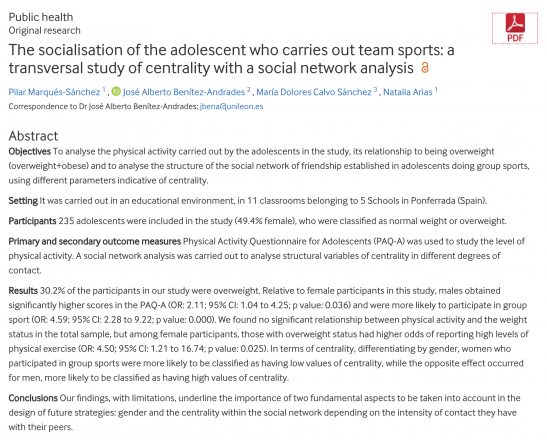Abstract
Objectives To analyse the physical activity carried out by the adolescents in the study, its relationship to being overweight (overweight+obese) and to analyse the structure of the social network of friendship established in adolescents doing group sports, using different parameters indicative of centrality.
Setting It was carried out in an educational environment, in 11 classrooms belonging to 5 Schools in Ponferrada (Spain).
Participants 235 adolescents were included in the study (49.4% female), who were classified as normal weight or overweight.
Primary and secondary outcome measures Physical Activity Questionnaire for Adolescents (PAQ-A) was used to study the level of physical activity. A social network analysis was carried out to analyse structural variables of centrality in different degrees of contact.
Results 30.2% of the participants in our study were overweight. Relative to female participants in this study, males obtained significantly higher scores in the PAQ-A (OR: 2.11; 95% CI: 1.04 to 4.25; p value: 0.036) and were more likely to participate in group sport (OR: 4.59; 95% CI: 2.28 to 9.22; p value: 0.000). We found no significant relationship between physical activity and the weight status in the total sample, but among female participants, those with overweight status had higher odds of reporting high levels of physical exercise (OR: 4.50; 95% CI: 1.21 to 16.74; p value: 0.025). In terms of centrality, differentiating by gender, women who participated in group sports were more likely to be classified as having low values of centrality, while the opposite effect occurred for men, more likely to be classified as having high values of centrality.
Conclusions Our findings, with limitations, underline the importance of two fundamental aspects to be taken into account in the design of future strategies: gender and the centrality within the social network depending on the intensity of contact they have with their peers.

